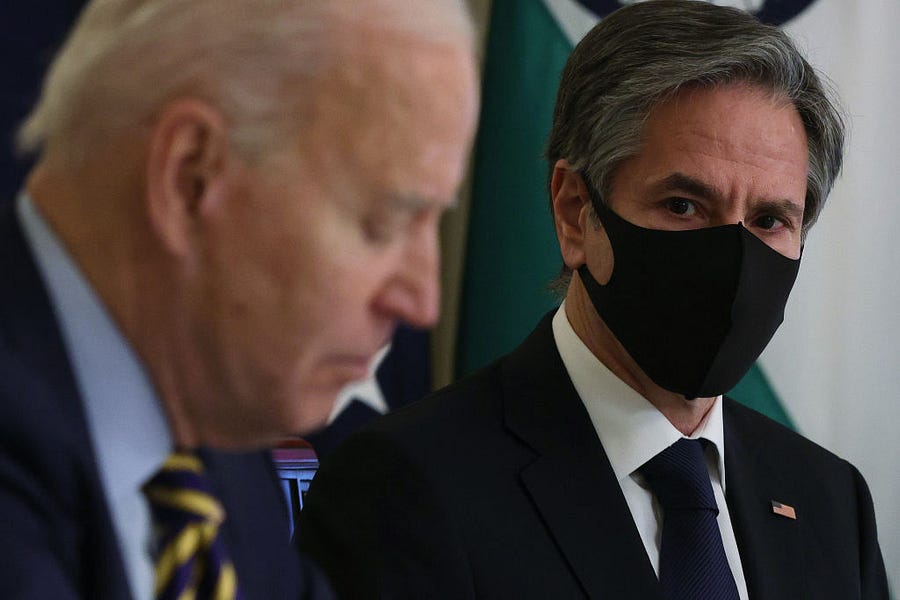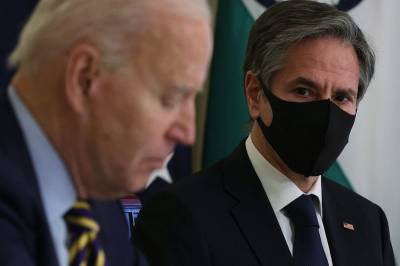Secretary of State Anthony Blinken this week vowed a “collective response” to Iran’s drone attack against an Israeli-operated tanker off the coast of Oman that left one British and one Romanian citizen dead. But President Joe Biden and his administration would do better to pause for a moment of collective self-examination. After more than six months in office, Biden’s strategy of maximum deference toward Iran is failing miserably.
At the outset of his presidency, Biden’s top national security officials asserted that by abandoning the Trump administration’s policy of maximum economic pressure, the United States could put Iran’s nuclear program “in a box.” They hoped to persuade Tehran to negotiate a “longer and stronger agreement” to replace the 2015 nuclear deal, formally known as the Joint Comprehensive Plan of Action (JCPOA). But the JCPOA was never much of a box: narrow, temporary accord that began expiring in late 2020 failed to account for the Islamic Republic’s undeclared nuclear activities, rein in its hostage-taking of American citizens, cease its sponsorship of terrorism or even curb its development of nuclear-capable missiles. As for the longer, stronger deal, it’s nowhere to be seen. Six months into Biden’s term, the results of his Iran strategy are already in.
When the Trump administration left office on January 20, 2021, the Islamic Republic was closer to financial collapse than most people realized. According to the International Monetary Fund, the regime’s accessible foreign exchange reserves had declined from $122 billion in 2018 to just $4 billion by the end of 2020. Had U.S. sanctions been enforced and increased during the first quarter of 2021, the mullahs might have run out of hard currency.
But that’s not what happened. Instead, the Biden administration stopped enforcing many of the most important U.S. economic sanctions on Iran—allowing Iran to drastically scale up its crude exports to China while also issuing a presidential waiver to allow Tehran to use billions of dollars in once-frozen accounts to pay debts to creditors.
If rescuing the clerical regime from a balance of payments crisis was not enough, Biden sent diplomats on a seemingly endless mission to offer Tehran a complete economic bailout—lifting all U.S. sanctions, even those imposed on banks and companies tied to terrorism and Iran’s Revolutionary Guard—in exchange for a return to the flawed JCPOA. Even more embarrassing for Biden, the Iranians refused direct talks. U.S. Special Envoy for Iran Rob Malley makes offers to European diplomats who then relay messages to the Islamic Republic in another room.
During the presidential transition, when Iran knew that Donald Trump’s hands were politically tied, the regime began producing high-enriched uranium at 20 percent purity—that has long been a red line for the international community because it dramatically shortens Iran’s breakout time to a bomb. At the same time, Iran refused to cooperate with an investigation by the International Atomic Energy Agency (IAEA) into undeclared nuclear sites and activities within the country.
At the March 2021 IAEA board meeting, U.S. allies were preparing to censure Iran for its misconduct—a path that could ultimately lead the IAEA to refer Iran’s nuclear file back to the U.N. Security Council. The Biden administration objected to anything that could provoke Tehran and pulled its allies back. Since then, the clerical regime has increased its enrichment to 60 percent, announced it would produce uranium metal (another move toward potentially developing nuclear weapons) and began extorting the IAEA by withholding and threatening to destroy inspection tapes from key facilities.
The president must face this unpleasant truth: Iran has vastly expanded its illicit nuclear activities on his watch. His policies of maximum deference, not Trump’s policies of maximum pressure, have allowed this.
The same is true of Iran’s terror activities in the Middle East and around the world. Whatever level of military deterrence that the United States restored by killing Qassem Suleimani—the theocracy’s overlord of terrorism and paramilitary activities– in early 2020 has disappeared. In Iraq it’s been open season on U.S. forces for militias taking orders from Tehran.
Biden did nothing in response to a March attack on a U.S. base that resulted in the death of a U.S. contractor—encouraging Iran to escalate by ordering drone strikes on American positions for months. Instead of ordering a military strike against key Islamic Revolutionary Guard Corps (IRGC) commanders in Iraq to restore deterrence, Biden ordered two pinprick retaliations against militia installations along the Syrian-Iraqi border.
Attacks against Saudi Arabia by Iran-backed Houthis and against Israel by Iran-backed Hamas and Islamic Jihad did nothing to change Biden’s offering Iran a bailout. Nor did last week’s tanker attack or this week’s attempted tanker hijacking.
But Biden’s most devastating decision thus far was to keep the offer of cash on the table for Tehran after the Department of Justice indicted four Iranians in a plot to kidnap an American citizen from New York City. This was an attempted terrorist attack on the U.S. homeland—a brazen scheme to snatch an American off American soil. If anything the Iranians have done over six months merited a final break from maximum deference, this was it. And yet, the response from the Biden administration was to reaffirm its commitment to rejoining the nuclear deal and lifting sanctions on Iran.
In an interview last week with MSNBC’s Mehdi Hasan, Malley said, “America is less safe because Iran has a more expansive nuclear program and because it accelerated and intensified its regional activities,” due to the Trump administration’s maximum pressure campaign and the killing of Soleimani.
Malley may be the most ideological of Biden’s senior advisors. But for those inside the administration who may be more clear-eyed—and certainly for Washington policy analysts and pundits—now should be a moment of reckoning for the precious time lost over the last six months.
Iran’s nuclear program is more dangerous today than it was six months ago. Iran’s terror activities are more aggressive and target Americans more frequently than they did six months ago. Iran’s terror proxies are more emboldened to attack American allies today than they were six months ago. These are facts—and they are the direct result of six months of maximum deference.
Richard Goldberg is a senior adviser at the Foundation for Defense of Democracies. He served on Capitol Hill, on the U.S. National Security Council, as the governor of Illinois’s chief of staff, and as a U.S. Navy Reserve intelligence officer. Twitter: @rich_goldberg






Please note that we at The Dispatch hold ourselves, our work, and our commenters to a higher standard than other places on the internet. We welcome comments that foster genuine debate or discussion—including comments critical of us or our work—but responses that include ad hominem attacks on fellow Dispatch members or are intended to stoke fear and anger may be moderated.
With your membership, you only have the ability to comment on The Morning Dispatch articles. Consider upgrading to join the conversation everywhere.